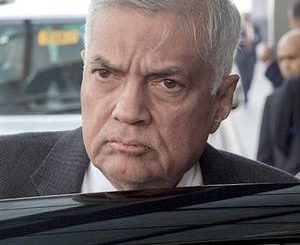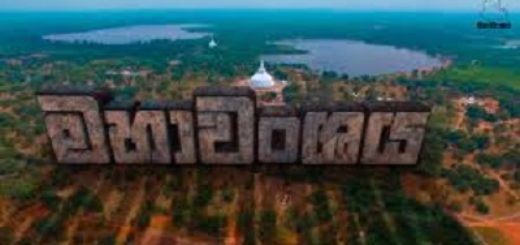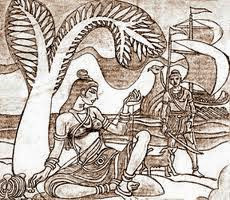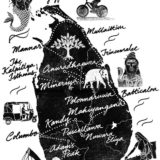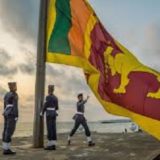What happened on August 5, 2020?
Mine, O thou lord of life, send my roots rain – Gerard Manly Hopkins
After zig-zagging under the pressures of multiple inimical forces, evolving history has once again returned to its traditional Centre to reclaim its roots. From the thirties the Marxists struggled to take the nation through parliamentary/electoral manoeuvres, and sometimes through brutal violence, to a socialist paradise. The nation rejected the false prophets and returned to its traditional democratic, pragmatic Centre governed by the Sinhala-Buddhists. From the forties the mono-ethnic extremists of the North launched a movement to take a part of the nation to an ethnic enclave. After the longest war the nation bounced back to the democratic Centre of the Sinhala-Buddhists. In the meantime, a group of Right-wing fascists in uniform attempted to stage a coup. That too was nipped in the bud with the democratic Centre winning again. In the last attempt a mish-mash of alien and the deracinated forces fought relentlessly and collectively to drag the nation away from its roots to a neo-liberal camp driven by Western dogmas. But it came crashing down in one big heap on August 5, 2020 like the mountain of garbage at Meetotamulla, burying those who dumped all their muck into it. All of them paid heavily for trying to drag history away from it roots. The last bastion of the corrupt and the decadent forces that stood in the way was the die-hard Right-wing citadel of Colombo. When that too came thundering down it brought down the last anachronistic panjandrum of the ancien regime, Ranil Wickremesinghe, who was hanging on to his crumbling fortress.
The fall of Colombo marks the beginning of a new era. It is more than the loss of numbers, or the traditional base of the UNP held firmly since its inception. It is the supreme symbol of the collapse of the Right-wing along with its leader. The Left went to pieces after J. R. Jayewardene swept the polls in 1977. The Right sank to its lowest depths on August 5 when the Rajapaksas won “the unwinnable” 2/3rd in 2020, after winning the “unwinnable war” in 2009 at Nandikadal and the equally threatening war against Covid-19.
Never has this happened ever before to the Right that stood solidly unshakeable like Sri Pada. Even in 1956 when the UNP fell to its lowest, Sir. John Kotelawela, the then leader, retained his Dodangaslanda seat. The UNP survived as a national institution and as a people-based organisation, despite facing massive assaults from the Left and the Sinhala-Buddhist forces. It never lost its political network, or the respect it gained from the Founding Fathers of independence.
In 1956 Sir. John at least had the opportunity to cross the floor and shake the hands of his rival, S. W. R. D. Bandaranaike, congratulating him on his victory, and retire with some dignity to his farm in Kent, UK. Ranil, on the other hand, goes home kicked out of Parliament unceremoniously by the people. He paid the ultimate price for dismissing the aspirations of the people with his neo-liberalism which had no roots in the hearts or minds of the people.
He delighted in being the King of the bastardized Western political culture sold to him by NGOs and Western embassies. Quite cynically, believing in his own imported ideology, he turned a blind eye – not to mention a deaf ear – to the forces that were cutting the ground under his feet. Neither the alien forces nor their intellectual side-kicks in academia and hangers-on, had the power to move the grassroot forces that were vital for his survival. Brushing aside the factors that matter, Ranil opted to live in his ideological bubble and when it burst on August 5th he hit the dirt for the last time. Yesterday’s rooster became a feather-duster overnight.
After the Senanayakes it was president Ranasinghe Premadasa who “peoplised” the Party. He led the Party with his down-to-earth Kehelwatte philosophy brewed by bare-foot foot-ballers. But from November 8, 1994 – and for the next 25 years, eight months and 23 days — the Party was hijacked by the trousered Kurunduwatte cricketers, most of them from Royal College, whose neo-liberalism, linked to the International Democratic Union (IDU), did their level best to drag the nation away from it roots.
August 5, 2020 was Sri Lanka’s Bastille Day when a regime disconnected with the people was thrown out, lock, stock and barrel. It was the equivalent of the humiliating routing of the Tamil Right-wing Vellalas on May 19, 2009 at Nandikadal. It was “1956” all over again with a lesser breed of Alzheimeric mediocrities repeating history for the umpteenth time. What surged on August 5th was a total rejection of the decadent politics by the overwhelming spirit and power of the determinative forces of history that had shaped the destiny of the nation down the ages.
Once again August 5th proved the massive power of the Sinhala-Buddhists to go to the brink and regain their lost heritage. Once again it proved that the Sinhala-Buddhists can muster, even at the eleventh hour, the necessary political clout, with or without the minorities, to determine their path in evolving history as they did in the past. In the post-colonial period Dudley Senanayake, Mrs. Sirimavo Bandaranaike, J. R. Jayewardene, Chandrika Kumaratunga, and Mahinda Rajapaksa have proved that the power of the Sinhala-Buddhist forces to rise from the depths of despair to the heights of glory. Their power has been proved with the ballot and also with the bullet. This is not triumphalism of the Sinhala-Buddhists. This is what is written in history of our time. Ranil failed because his immoral regime committed the other heinous crime of trying to hijack history and park it in the backyard of Jehan Perera and Pakiasothy Saravanamuttu.
This is also the moment of renewal. History sometimes acts like a vacuum cleaner. From time to time nations need a powerful force to suck the muck out of the political system. August 5th was a critical date on which the nation was balancing between Ranil’s regime rigged by rorts and the Rajapaksas promising a new beginning. The subterranean historical forces of the day came, in the nick of time, as the cleanser to regenerate the nation and restore the values robbed Ranil’s regime. One of his biggest crimes was to let the robber barons run riot. In every which way he lost the moral base on which power is won and retained. Politics, after all, is all about morality. Those who undermine morality lose authority and legitimacy to rule. The life span of immoral regimes is very short.
August 5th was the day the people went to the cleaners. It was also the day a new political map was drawn by the people with their little crosses at the polling booths. They declared, in no uncertain terms, that the power lies with the central force of history and not in the peripheral hands of the Johnnies-come-lately. And that Centre has been captured comprehensively by the Rajapaksa brothers. Today there is no Right, no Left nor is there the North as we knew it. There is only the Centre held by the Rajapaksas and it has been entrusted with untrammelled power by the people to shape the next stage of evolving history.
Ranil Wickremesinghe, who whittled away the enlightened national values, the image and the integrity of the Grand Old Party of giants each day he occupied the chair of leadership, should take full responsibility for the massacre of the UNPers on August 5. For 26 years – give or take a few days — he was very clever at manipulating the chess pieces at the top for his own survival and glory. But he never had the common touch or sense to be a leader of the people. He never had his feet on the ground. He was hoisted by his own petard. Eventually he became a victim of his own manoeuvres. The Bond Scam, the Easter Sunday attack, the 19th Amendment that kept him swinging in the air like a rope round his neck, changing the constitution to enthrone the minorities at the expense of the majority, the betrayal in Geneva, the abuses of parliamentary procedures and privileges to cover-up his sins and keep him in power etc., were all his creations which accumulated, one by one, to reduce his image to that of a chained monkey dancing to the tune of his organ-grinders in the West. On top of all this, the mighty forces of history, resisting his moves to drag the nation away from its roots, came down on him a ton of bricks and pulverised him and his irrelevant and alien ideology to smithereens.
He will also be remembered as the founder of “social distancing” that kept the people away from the Party. He never understood the dynamic swings of politics, or how emerging forces determined the shape, form and direction of unfolding events, or even how to read the plain visible signs that were telling him to go. The more he was told to go the more he dug deep into his set refusing to go. How could he understand politics when he couldn’t understand the meaning of an election? Each time he lost an election – at least one for each year of his stewardship – he was made to believe that it was an expression of the indispensability of his leadership. He acted as if he could override the will of the people with his government run by do-nothing committees that took him nowhere. It took a direct kick in his pants for him to realise that the people do not want him anymore. The unceremonious eviction from Parliament by the people will be the badge he will carry for the rest of his life. It is a sad ending for a man who assumed that he knew everything that needs to be known in politics.
It took a long time for the message to sink in. Now it seems that the message has sunk in. He goes to live on a Parliamentary pension which he should, rightfully, give it back to the people for leaving them with a legacy that is empty as his political career. A leader is judged by the victories he/she scores in time of crises. Sadly, there isn’t a single significant victory which stands to his credit on the national stage.
History has been kind to him and given three chances to occupy the Prime Ministerial seat. Three chances to solve the issues exploding in his face. He botched it each time he took the reins of power. For instance, the biggest threat to the nation was Velupillai Prabhakaran. When the time came he surrendered the national interests by signing the Cease Fire Agreement (22/2/2002) with international guarantees without telling the President, the Parliament, his Party or the people. Prabhakaran treated it with contempt it deserved and left him twisting in the winds of despair. Second, was his gigantic effort to change the Constitution, starting with his futile 19th Amendment. Soon it will be wiped out of the statute book as it has failed to serve any man, woman or the LGBT.
He was also hailed as “Mr. Clean” and the better economic manager. With the Bond scandal all that went down the drain. He also went behind George Soros hoping that the patron of open society would come to his rescue with massive investments. But Soros had no time for him. Aiming to rope in the patronage of the Western investors he joined the International Democratic Union (IDU), the powerful club of the capitalist hub. His membership did not help to get any favours from the IDU either. Lastly, in a sacrificial ritual at UNHRC in Geneva, he offered to the West the heads of the heroic soldiers who fought and won peace for all to enjoy normalcy, dignity and the democratic rights denied by the Tamil fascist regime.
It was the last straw that broke the camel’s back. Handing the soldiers to a foreign court to be tried on hear-say evidence cooked up by the Tamil lobby and NGOs questioned his loyalty to the nation. In handing over his soldiers to be tried by foreign judges was an act that betrayed his confidence in the national judiciary. In other words, he was telling the world and the nation that he had no faith in the local judiciary to deliver justice on testable evidence. People in return paid him back by declaring no confidence in his role as leader of the nation.
The public declaration of the will of the people was, perhaps, too harsh on him. But how can the people trust him to deliver justice when he, as a lawyer of the national legal system, has rejected the prime legal instrumentality of the nation, as unreliable, unworthy and untrustworthy means incapable of upholding the law fairly, independently and objectively? He has placed his trust in foreign judges and not ours!
If anything, his career exposes him as the only outstanding model that should be avoided in politics at any cost. No one can emulate his style or ideology and hope to win or retain power. His idea of being a leader is to stand on the shore of politics and command the waves rising from oceans of history to stop rolling. Long before him King Canute, pointing to the limitations of power, proved to his ministers that it just can’t be done.
Something that the new leaders of the UNP should learn is that it is not possible to take history out of politics. If the new leadership hopes to gain credibility and acceptance it must come back to the centre of history. Politics cannot drift too far away from history. Example: After “1956” the alienated UNP went back to Dudley Senanayake – the accepted centre of history, the collective force evolving in time to mould politics. As state by Arnold Toynbee it is possible to turn the wheel of history only a wee bit at a time. It is not possible to turn it full circle overnight. Nor is it possible to take what belongs to the majority, who were the makers of history, and hand it over to the minority hoping that it would be the magic formula to resolve majority-minority conflicts and tensions.
Besides, the decimated and the inexperienced leadership in the opposition now is no match for the seasoned bull-fighters in the ring. Sajith cannot go far out from the Centre to appease the extremist demands of the minorities and at the same time win back the majority that defected from the UNP. In any case, it is not possible at this stage to know for how long the unpredictable and opportunistic minorities will be with him. There is only the Sinhala-Buddhist Centre that is in command right now. The rest is chaos. They will take time to find their place and direction in the political compass.
Until then we can all say “Adios!” to Ranil.
We all must wish him a better time in retirement than he had in power.

